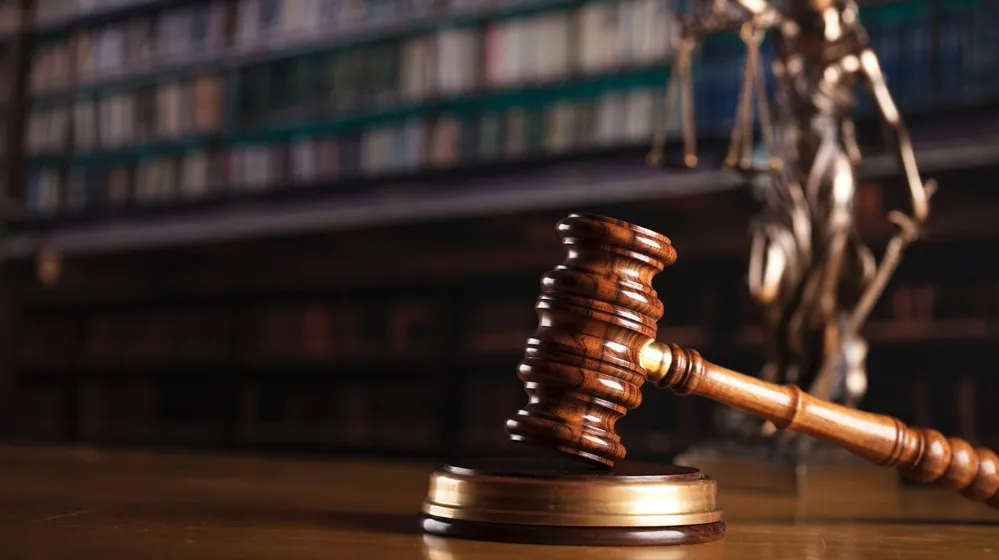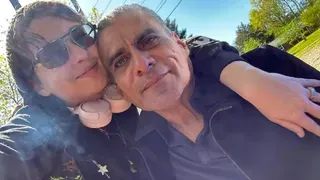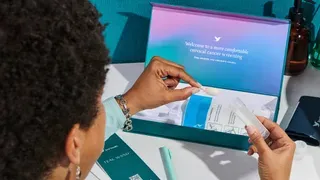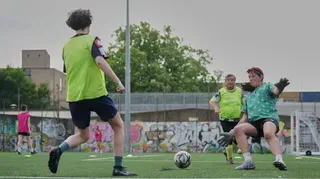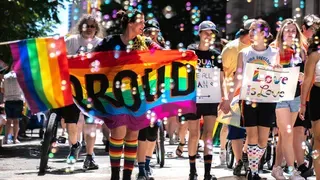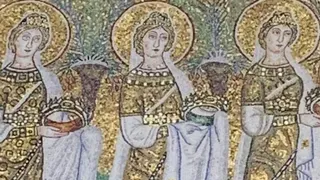March 25, 2008
Amaechi Spurred by Sir Ian to Come Out as Gay
Kilian Melloy READ TIME: 6 MIN.
Retired NBA star John Amaeche says that openly gay actor sir Ian McKellan was his inspiration for coming out the closet in his 2007 autobiography, Man in the Middle.
In a new interview Amaeche opens up about his experiences as a gay man playing in the homophobic world of professional sports, and about his life since retiring from the NBA in 2003.
Though born in MA in 1971, Amaechi grew up in London because his mother is English. Overweight as a teen, Amaeche became an athlete and found his way into pro basketball.
Since his retirement Amaeche, who has a degree in psychology, has made a career for himself as a motivational speaker. He also serves as a commentator for the NBA and heads up the Amaechi Basketball Centres Foundation, a U.K. charity that provides sports opportunities for youth.
Said Amaeche of his decision to come out as a gay athlete, "I knew it would be fuss-worthy, especially in America."
Being a gay athlete is not the first seemingly paradoxical role that Amaeche has embraced. The basketball star told PinkNews.co.uk, "In America black people who speak with an English accent aren't black."
Added Amaeche, "I knew that when I went over there I would always be English first and I always was. You would never read a report about me referring to me as a black athlete, always from England, the English athlete, UK based, British, that's always what they would use."
Speaking about his decision to keep quiet about his sexuality prior to his retirement from pro sports, Amaeche said, "I don't want to throw it away for something that I can't help, so what I can do is control my behavior and say OK I can be lonely."
There is a cost to that strategy, though, as Amaeche pointed out, saying, "But eventually the cost of that is very skewed and you know that you're not going to play as well, you're not going to be as satisfied."
Recollecting the ferocious intensity of attention that his coming out brought to bear upon him from the American media-at one point he was interviewed more than 100 times per week--Amaeche said, "I thought it would be more negative than it was actually."
Commenting on Americans' reaction, Amaeche added, "I didn't give them enough credit. My nature is always to assume the worst but I thought it would be a lot more bloodthirsty."
PinkNews.co.uk recounted that some of the worst response came from within the professional sports community, with comments uttered by former basketball star Tim Hardaway.
Speaking on radio, Hardaway said, "I hate gay people, so I let it be known."
Continued Hardaway, "I don't like gay people and I don't like to be around gay people."
Hardaway went on, "I'm homophobic. I don't like it."
Said Hardaway, "It shouldn't be in the world or in the United States."
Hardaway elaborated, "If you have 12 other ballplayers in your locker room that's upset and can't concentrate and always worried about him in the locker room or on the court or whatever, it's going to be hard for your team mates to win and accept him as a team mate."
Reacting in the PinkNews.com.uk interview, Amaeche did not fault Hardaway for his words.
Said Amaeche, "What he said was the [attitude] of an awful lot of people, it's just an awful lot of people know better than to say it."
Added Amaeche, "There was a blog that I saw that said, 'John Amaechi has a right to be gay, Tim Hardaway has a right to hate him for it.' That's the bizarre twisted attitude of many people. They just don't want to vocalize it."
Amaeche knew that coming our would generate a sensation, and the thought almost kept him in the closet.
Said the star ball player, "I nearly just decided not to ever go back to America and just stay here and say 'let them froth around in their own mess,' but I went to Manchester Pride and Sir Ian McKellen was the Marshal," he told PinkNews.co.uk.
Continued Amaeche, "I'm not very fluffy with these things and I'm quite cynical. However, the sight of him waving and looking at the reactions of people to him waving, the sight in people's eyes of 'That's Gandalf, international superstar'" had an effect on the athlete.
"I thought, obviously I am not anything like that status of superstar or even celebrity, but if on a smaller scale I could have an impact that would be a good thing," Amaeche related to PinkNews.co.uk.
Said Amaeche, "If you were relatively stupid, and unfortunately many people are, you would imagine all gay people to be either like Graham Norton or Jack from Will and Grace, so I thought it would be quite interesting to throw something else into the mix, namely me."
As far as not coming out when he was still an active player in the NBA, Amaeche phrased his opinion plainly, citing the fact that America does a poor job of accepting and itegrating GLBT people into its work force generally.
Said Amaeche, "In 30 states in America you can be fired for being gay."
Amaeche went on, "Nobody in their logical mind would say a player with my skills, not a superstar just a good solid player, versus another solid player who's not gay, will get the job in today's world."
Moreover, being a gay player on a team of athletes means that coming out affects more than the individual who makes that decision. Said Amaeche, "There is more of a dynamic there beyond your own personality and there is a very legitimate thing that if you are going to come out with a team, when do you do it? Do you do it before the season starts? Beginning of the season when you've won a few games? Mid-season right before the play-offs? When is the good time?"
Citing his own experience with an aroused media, Amaeche pointed out, "If an average NBA player who has been retired for three years can be an international story and certainly a national news story in America, with six months of constant comment and constant articles, what happens if a player is still playing?"
Added the athlete, "Does anybody think that wouldn't throw a team into some kind of turmoil?"
Addressing the issue of institutional homophobia in sports, Amaeche said, "A lot of people like to believe it's because these dumb urban guys can't get their minds around diversity and that's not the case."
Amaeche's coming out may not have overcome the homophobia of pro sports, but it did deal a blow to hidebound attitudes. The former player is now tackling his new career with a similar view.
"I really love to talk to people who when you walk in the door you look at them and you smile nicely, sagely and they look back at you and smile with similarly veiled contempt, knowing they are going to spend two hours hearing nothing that could possibly help them in the future," Amaeche said of his career as a motivational speaker.
"And then you blow their doors off," Amaeche continued. "I love that."
Said Amaeche, who is now pursuing his doctorate, "There is an ability, because of my playing days, because of my psychology degrees, because of my platform, to make a difference and that's what I'm doing."
Explained the athlete, "When you speak and you are in front of an audience who look at you think: 'He's the black one, he's the gay one, he's the ex athlete; what's he got to offer me? I'm special, a CEO,' and you realize in the course of two hours you have got them in the palm of your hand."
Amaeche spoke with the U.K. news outlet about American politics, saying, "America needs more help."
Amaeche went on, "[Democratic hopeful for the 2008 presidential nomination Sen.]Hillary [Clinton] has been to the big gay lobbying organisations. I spoke with her in fact at the HRC."
Amaeche went on, "But at the same time [American politicians] don't talk about marriage equity."
Added Amaeche, "Policy informs the foolish, laws inform people who don't think. So, if your law is that these people can't marry, that automatically informs those who are less intelligent that these people are not as good as you, they are not equal to you, and that's a very powerful message."
Said Amaeche, "Unless someone steps up and says 'by the way, we should probably just go with equality,' then we're going to be in trouble."
Kilian Melloy serves as EDGE Media Network's Associate Arts Editor and Staff Contributor. His professional memberships include the National Lesbian & Gay Journalists Association, the Boston Online Film Critics Association, The Gay and Lesbian Entertainment Critics Association, and the Boston Theater Critics Association's Elliot Norton Awards Committee.
